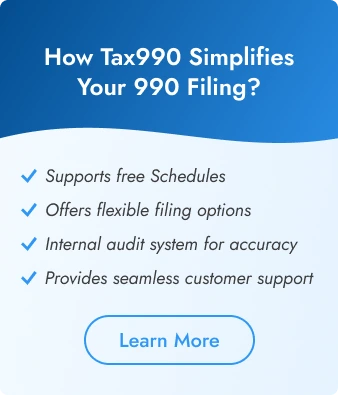Form 990 Schedule R Instructions
- Updated August 21, 2024 - 2.00 PM - Admin, Tax990
Organizations that file Form 990 may be required to attach Schedule R to report additional information regarding related organizations and unrelated partnerships.
Read through this article to gather more information regarding the purpose, filing requirements, and instructions on how to complete Schedule R.
Table of Contents
What is the Purpose of Form 990 Schedule R?
Schedule R is used by organizations to provide the IRS with detailed information about related organizations, certain transactions with related organizations, and certain unrelated partnerships through which the organization carries out significant activities.
Who Must File Form 990 Schedule R?
Organizations that answered “Yes” on the following lines of Form 990 must attach Schedule R and complete the applicable parts.
| Answered “Yes” on | Parts required to be completed |
|---|---|
| Part IV, line 33 (regarding disregarded entities) | Schedule R, Part I |
| Part IV, line 34 (regarding related organizations) | Schedule R, Parts II, III, IV, and V (line 1) |
| Part IV, line 35b (regarding transactions with controlled entities) | Schedule R, Part V, line 2 |
| Part IV, line 36 (regarding transfers to exempt noncharitable related organizations) | Schedule R, Part V, line 2 (Only section 501(c)(3) organizations) |
| Part IV, line 37 (regarding activities conducted through unrelated partnership) | Schedule R, Part VI |
How to Complete Form 990 Schedule R?
In total, there are 7 parts in Schedule R. You should complete the parts applicable to your organization as described above.
Part I - Identification of Disregarded Entities
This part requires you to provide details regarding the organizations that are treated as disregarded entities by your organization.

You must enter the following details
- Name, address, and EIN (if applicable) of each disregarded entity
- Primary activity
- Legal domicile (U.S. state or foreign country)
- Total income
- End-of-year assets
- Direct controlling entity
Part II - Identification of Related Tax-Exempt Organizations
In this part, you are required to provide details regarding all the tax-exempt organizations that are related to your organization.
Note:
Governmental units and Instrumentalities and foreign governments are also treated as tax-exempt organizations

You must enter the following details
- Name, address, and EIN (if applicable) of each related organization
- Primary activity
- Legal domicile (U.S. state or foreign country)
- Exempt Code section
- Public charity status (if section 501(c)(3))
- Direct controlling entity
- Section 512(b)(13) controlled entity (“Yes” or “No”)
Part III - Identification of Related Organizations Taxable as a Partnership
This part requires you to report details about any related organizations treated as partnerships for federal tax purposes.
Note:
If the partnership is related to your organization due to being a parent, brother, or sister and your organization isn't a member in the partnership, then complete only columns (a), (b), and (c), and enter “N/A” in other columns.

You must enter the following details
- Name, address, and EIN (if applicable) of each related organization
- Primary activity
- Legal domicile (U.S. state or foreign country)
- Direct controlling entity
- Predominant income (related, unrelated, excluded from tax under sections 512—514)
- Share of total income
- Share of end-of-year assets
- Disproportionate allocations (“Yes” or “No”)
- Code V - UBI amount in box 20 of Schedule K-1 (Form 1065)
- General or managing partner (“Yes” or “No”)
- Percentage ownership
Part IV - Identification of Related Organizations Taxable as a Corporation or Trust
In this part, you should enter details regarding the related organizations that are treated as a C or S corporation or trust for federal tax purposes.
Note:
If the corporation or trust is related to your organization due to being a parent, brother, or sister and your organization doesn’t have an ownership interest in the corporation or trust, then complete only columns (a), (b), (c), and (e) and enter “N/A” in other columns.

You must enter the following details
- Name, address, and EIN (if applicable) of each related organization
- Primary activity
- Legal domicile (U.S. state or foreign country)
- Direct controlling entity
- Type of entity (C corp, S corp, or trust)
- Share of total income
- Share of end-of-year assets
- Percentage ownership
- Section 512(b)(13) controlled entity (“Yes” or “No”)
Then, provide details such as the type of transaction, the amount involved, and the method of determining the amount involved.
Part V - Transactions With Related Organizations
This part is comprised of a series of “Yes” or ”No” questions regarding various types of transactions that occurred between your organization and the related organizations.

The transactions include gifts, grants, or capital contributions, loans or loan guarantees, dividends, sale, purchase, or exchange of assets, lease of facilities, equipment, or other assets, and more.
Part VI - Unrelated Organizations Taxable as a Partnership
This part requires you to report details regarding unrelated organizations that meet the following conditions
- The Unrelated organization is treated as a partnership for federal tax purposes (Except S corporations).
- Your organization was a partner or member of the unrelated partnership.
- Your organization conducted more than 5% of its activities based on its total assets or total revenue for the tax year (whichever is greater) through the unrelated partnership.

Similar to the previous parts, enter the details required regarding each entity in the tabular column provided.
Part VII - Supplemental Information
In this part, The IRS requires you to provide an explanation for some of the questions in the previous parts. you can also provide additional information regarding any other questions from the previous parts here.
Choose Tax990 to file your Form 990 with Schedule R!
Tax 990 is an IRS-authorized e-file provider that includes your required Schedules automatically based on the information you enter on your Form 990.
Additionally, Tax 990 offers multiple features that simplify your 990 filing including,
The option to choose between our Form-based and Interview-style form preparation methods
Ensure the accuracy of your 990 forms with our Internal audit check system.
Invite your organization members to help manage filing or review and approve returns.
Seamless customer support via live chat, phone, and email.



